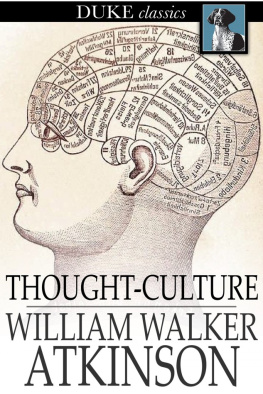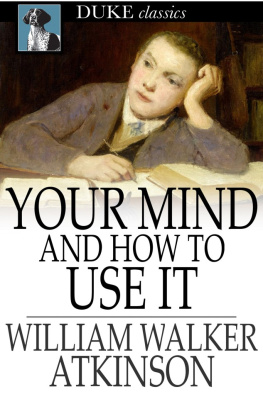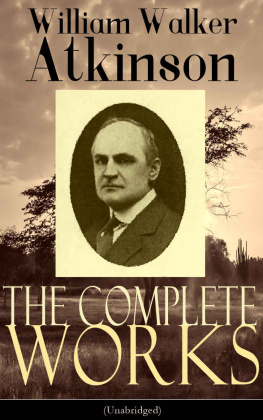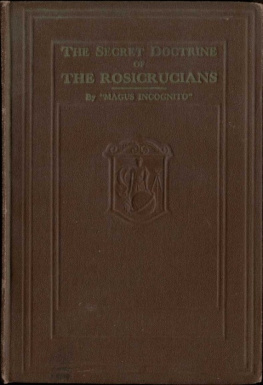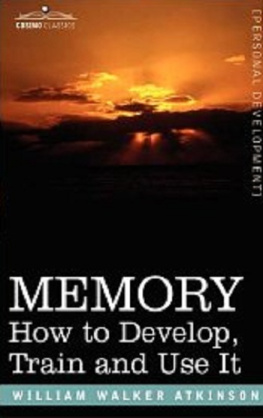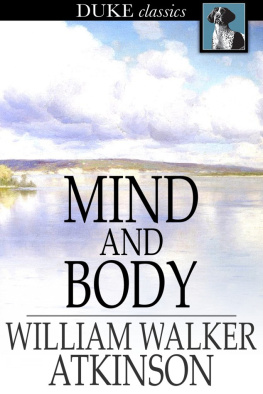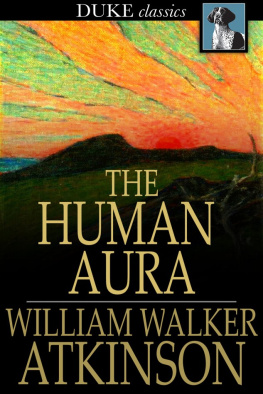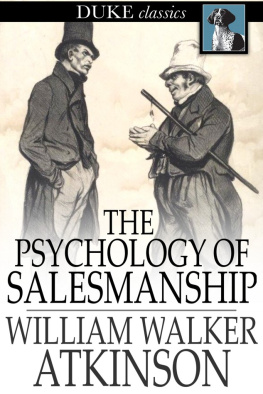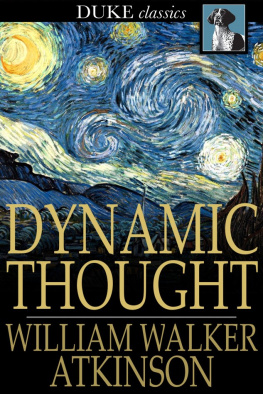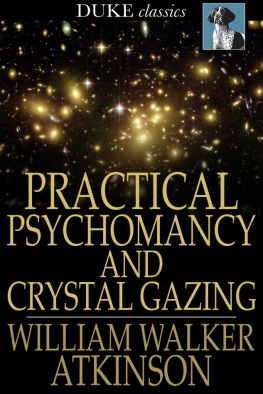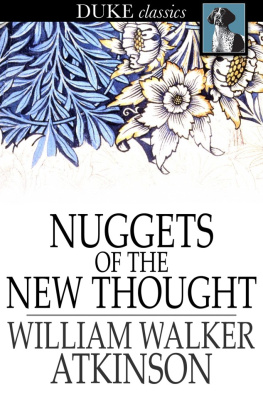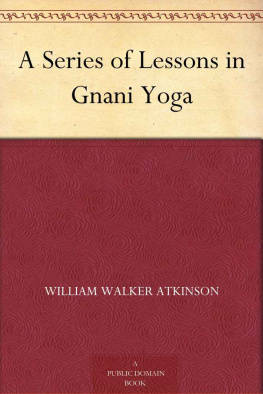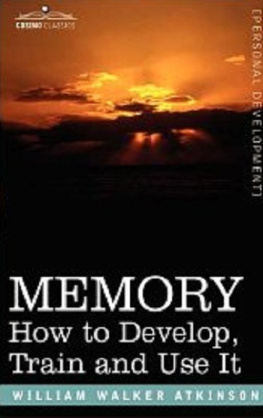William Walker Atkinson - Thought-Culture: Or Practical Mental Training
Here you can read online William Walker Atkinson - Thought-Culture: Or Practical Mental Training full text of the book (entire story) in english for free. Download pdf and epub, get meaning, cover and reviews about this ebook. year: 2013, publisher: Duke Classics, genre: Religion. Description of the work, (preface) as well as reviews are available. Best literature library LitArk.com created for fans of good reading and offers a wide selection of genres:
Romance novel
Science fiction
Adventure
Detective
Science
History
Home and family
Prose
Art
Politics
Computer
Non-fiction
Religion
Business
Children
Humor
Choose a favorite category and find really read worthwhile books. Enjoy immersion in the world of imagination, feel the emotions of the characters or learn something new for yourself, make an fascinating discovery.
- Book:Thought-Culture: Or Practical Mental Training
- Author:
- Publisher:Duke Classics
- Genre:
- Year:2013
- Rating:5 / 5
- Favourites:Add to favourites
- Your mark:
- 100
- 1
- 2
- 3
- 4
- 5
Thought-Culture: Or Practical Mental Training: summary, description and annotation
We offer to read an annotation, description, summary or preface (depends on what the author of the book "Thought-Culture: Or Practical Mental Training" wrote himself). If you haven't found the necessary information about the book — write in the comments, we will try to find it.
Though he typically wrote under the guise of anonymity, using an array of pseudonyms and pen names, author and thinker William Walker Atkinson was an enormously influential figure in the New Thought movement. In fact, he is often credited with being the original source of the ideas that later coalesced under the term the Law of Attraction. The volume Thought-Culture offers an array of practical tips for those who are interested in improving their mental acuity.
William Walker Atkinson: author's other books
Who wrote Thought-Culture: Or Practical Mental Training? Find out the surname, the name of the author of the book and a list of all author's works by series.
Thought-Culture: Or Practical Mental Training — read online for free the complete book (whole text) full work
Below is the text of the book, divided by pages. System saving the place of the last page read, allows you to conveniently read the book "Thought-Culture: Or Practical Mental Training" online for free, without having to search again every time where you left off. Put a bookmark, and you can go to the page where you finished reading at any time.
Font size:
Interval:
Bookmark:

Or Practical Mental Training
First published in 1909
ISBN 978-1-62013-206-7
Duke Classics
2013 Duke Classics and its licensors. All rights reserved.
While every effort has been used to ensure the accuracy and reliability of the information contained in this edition, Duke Classics does not assume liability or responsibility for any errors or omissions in this book. Duke Classics does not accept responsibility for loss suffered as a result of reliance upon the accuracy or currency of information contained in this book.
In other volumes of this series we have considered the operations of thehuman mind known as Will, Memory, etc. We now approach the considerationof those mental activities which are concerned with the phenomena ofthoughtthose activities which we generally speak of as the operationof the intellect or reason.
What is thought? The answer is not an easy one, although we use the termfamiliarly almost every hour of our waking existence. The dictionariesdefine the term "Thought" as follows: "The act of thinking; the exerciseof the mind in any way except sense and perception; seriousconsideration; deliberation; reflection; the power or faculty ofthinking; the mental faculty of the mind; etc." This drives us back uponthe term, "to think" which is defined as follows: "To occupy the mind onsome subject; to have ideas; to revolve ideas in the mind; to cogitate;to reason; to exercise the power of thought; to have a succession ofideas or mental states; to perform any mental operation, whether ofapprehension, judgment, or illation; to judge; to form a conclusion, todetermine; etc."
Thought is an operation of the intellect. The intellect is: "thatfaculty of the human soul or mind by which it receives or comprehendsthe ideas communicated to it by the senses or by perception, or othermeans, as distinguished from the power to feel and to will; the power orfaculty to perceive objects in their relations; the power to judge andcomprehend; also the capacity for higher forms of knowledge asdistinguished from the power to perceive and imagine."
When we say what we "think," we mean that we exercise the facultieswhereby we compare and contrast certain things with other things,observing and noting their points of difference and agreement, thenclassifying them in accordance with these observed agreements anddifferences. In thinking we tend to classify the multitude ofimpressions received from the outside world, arranging thousands ofobjects into one general class, and other thousands into other generalclasses, and then sub-dividing these classes, until finally we havefound mental pigeon-holes for every conceivable idea or impression. Wethen begin to make inferences and deductions regarding these ideas orimpressions, working from the known to the unknown, from particulars togeneralities, or from generalities to particulars, as the case may be.
It is this faculty or power of thoughtthis use of the intellect, thathas brought man to his present high position in the world of livingthings. In his early days, man was a much weaker animal than those withwhom he was brought into contact. The tigers, lions, bears, mammoths,and other ferocious beasts were much stronger, fiercer, and fleeter thanman, and he was placed in a position so lacking of apparent equal chanceof survival, that an observer would have unhesitatingly advanced theopinion that this weak, feeble, slow animal must soon surely perish inthe struggle for existence, and that the "survival of the fittest" wouldsoon cause him to vanish from the scene of the world's activities. And,so it would have been had he possessed no equipment other than those ofthe other animals; viz., strength, natural weapons and speed. And yetman not only survived in spite of these disadvantages, but he hasactually conquered, mastered and enslaved these other animals whichseemed likely to work his destruction. Why? How?
This feeble animal called man had within him the elements of a newpowera power manifested in but a slight degree in the other animals.He possessed an intellect by which he was able to deduce, compare,inferreason.
His lack of natural weapons he overcame by borrowing the idea of thetooth and claw of the other animals, imitating them in flint and shapingthem into spears; borrowing the trunk of the elephant and the paw of thetiger, and reproducing their blow-striking qualities in his wooden club.Not only this but he took lessons from the supple limbs and branches ofthe trees, and copied the principle in his bow, in order to project itsminature spear, his arrow. He sheltered himself, his mate and hisyoung, from the fury of the storm, first by caves and afterwards by rudehouses, built in inaccessible places, reached only by means of crudeladders, bridges, or climbing poles. He built doors for his habitations,to protect himself from the attacks of these wild enemieshe heapedstones at the mouth of his caves to keep them out. He placed greatboulders on cliffs that he might topple them down on the approachingfoe. He learned to hurl rocks with sure aim with his strong arm. Hecopied the floating log, and built his first rude rafts, and thenevolved the hollowed canoe. He used the skins of animals to keep himwarmtheir tendons for his bowstrings. He learned the advantages ofcooperation and combined effort, and thus formed the first rudiments ofsociety and social life. And finallyman's first great discoveryhefound the art of fire making.
As a writer has said: "For some hundreds of years, upon the generalplane of self-consciousness, an ascent, to the human eye gradual butfrom the point of view of cosmic evolution rapid, has been made. In arace large-brained, walking-erect, gregarious, brutal, but king of allother brutes, man in appearance but not in fact, was from the highestsimple-consciousness born the basic human faculty, self-consciousnessand its twin, language. From these and what went with these, throughsuffering, toil and war; through bestiality, savagery, barbarism;through slavery, greed, effort, through conquests infinite, throughdefeats overwhelming, through struggle unending; through ages of aimlesssemi-brutal existence, through subsistence on berries and roots; throughthe use of the casually found stone or stick; through life in deepforests, with nuts and seeds, and on the shores of waters with mollusks,crustaceans and fish for food; through that greatest, perhaps, of humanvictories, the domestication and subjugation of fire; through theinvention and art of bow and arrow; through the training of animals andthe breaking of them to labor; through the long learning which led tothe cultivation of the soil; through the adobe brick and the building ofhouses therefrom; through the smelting of metals and the slow birth ofthe arts which rest upon these; through the slow making of alphabetsand the evolution of the written work; in short, through thousands ofcenturies of human life, of human aspiration, of human growth, sprangthe world of men and women as it stands before us and within us todaywith all its achievements and possessions."
The great difference between thought as we find it in man, and its formsamong the lower animals lies in what psychologists have called"progressive thought." The animals advance but little in their thinkingprocesses but rest content with those of their ancestorstheir thoughtseems to have become set or crystallized during the process of theirevolution. The birds, mammals and the insects vary but little in theirmental processes from their ancestors of many thousand years ago. Theybuild their nests, or dens, in almost precisely the same manner as didtheir progenitors in the stone-age. But man has slowly but steadilyprogressed, in spite of temporary set-backs and failures. He hasendeavored to progress and improve. Those tribes which fell back inregard to mental progress and advancement, have been left behind in therace, and in many cases have become extinct. The great natural law ofthe "survival of the fittest" has steadily operated in the life of therace. The "fittest" were those best adapted to grapple with and overcomethe obstacles of their environment, and these obstacles were bestovercome by the use of the intellect. Those tribes and those individualswhose intellect was active, tended to survive where others perished, andconsequently they were able to transmit their intellectual quality totheir descendants.
Font size:
Interval:
Bookmark:
Similar books «Thought-Culture: Or Practical Mental Training»
Look at similar books to Thought-Culture: Or Practical Mental Training. We have selected literature similar in name and meaning in the hope of providing readers with more options to find new, interesting, not yet read works.
Discussion, reviews of the book Thought-Culture: Or Practical Mental Training and just readers' own opinions. Leave your comments, write what you think about the work, its meaning or the main characters. Specify what exactly you liked and what you didn't like, and why you think so.

